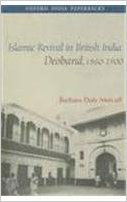This book is an important contribution to the existing literature on the social and intellectual history of Indian Muslims in the nineteenth cent¬ury. It is a sympathetic account of the temporal and spiritual concerns of the Ulama, and attempts to show how these concerns were integrated into a unified world-view. The focus of this study is on the acti¬vities and growth of the Darul Uloom at Deoband, perhaps the most influential of the Islamic academies of South Asia. Most intellectual histo¬ries of Indian Muslims of this period have concentrated on the modernist Aligarh move¬ment and Sir Syed Ahmed Khan. By examining the changing situation and ideo¬logies of the more tradition¬alist Ulama, Barbara Metcalf has redressed an imbalance and made a definitive contribution to our understanding of modern Islam in India. The educational, organiza¬tional and reformist efforts of the Ulama contrast with the better known modernist move¬ments of the nineteenth cen¬tury which were more in¬fluenced, among Hindus and Muslims alike, by Western ideologies and practices. Met¬calf argues that the Ulama, though working within a ‘re¬pertoire of received beliefs’, were not mere ‘relics of a traditional unchanging past’.
Sept-Oct 1983, volume 8, No 2

